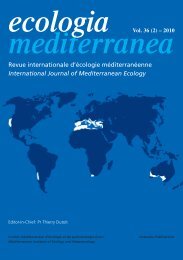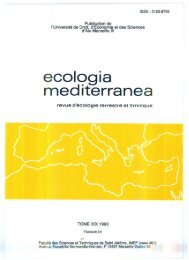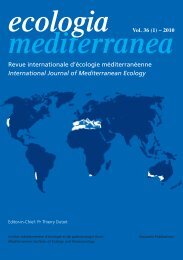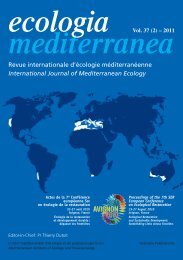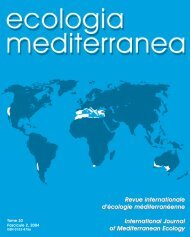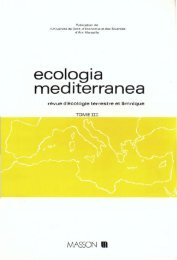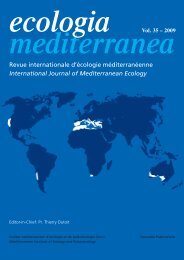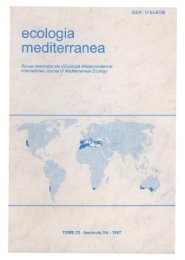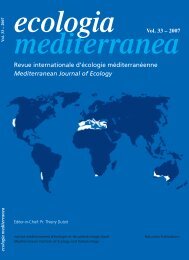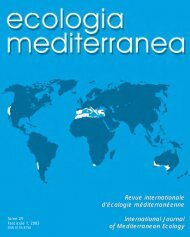Vol. 32 – 2006 - Ecologia Mediterranea
Vol. 32 – 2006 - Ecologia Mediterranea
Vol. 32 – 2006 - Ecologia Mediterranea
You also want an ePaper? Increase the reach of your titles
YUMPU automatically turns print PDFs into web optimized ePapers that Google loves.
Évolution des habitats<br />
et changement climatique :<br />
quelles conséquences pour les populations de Lézard ocellé,<br />
Lacerta lepida (Saurien, Lacertidés),<br />
en limite nord de répartition ?<br />
Habitat evolution and climatic changes:<br />
what are the consequences for the populations of Ocellated Lizard,<br />
Lacerta lepida (Sauria, Lacertidae), on the northern distribution limit?<br />
Résumé<br />
L’aire méditerranéenne française offre de<br />
bonnes conditions pour étudier les fluctuations<br />
d’aire de distribution sous l’effet du réchauffement<br />
climatique. Dans cette région, on doit en<br />
effet s’attendre à une remontée latitudinale des<br />
espèces thermophiles qui y sont inféodées.<br />
Cette hypothèse est évaluée sur le Lézard ocellé,<br />
Lacerta lepida, une espèce typique des milieux<br />
ouverts ouest-méditerranéens. Dix populations<br />
situées en limite nord de la distribution mondiale<br />
de l’espèce ont fait l’objet d’une analyse<br />
paysagère à partir de photos aériennes. Au<br />
cours des cinquante dernières années, on<br />
constate une perte importante des habitats<br />
ouverts au profit des boisements et des cultures.<br />
Ce processus s’accompagne d’un morcellement<br />
et d’un isolement accru des populations qui se<br />
traduit par un déclin rapide des populations de<br />
Lézards ocellés. L’étude montre que l’évolution<br />
des paysages engendrée par la déprise rurale<br />
(reforestation ou mise en culture de zones<br />
anciennement pâturées) joue un rôle dominant<br />
dans la dynamique spatiale de certaines espèces<br />
animales méditerranéennes. Dans le cas du<br />
Lézard ocellé, l’évolution des habitats apparaît<br />
prépondérante sur les effets du réchauffement<br />
climatique, d’où sa régression aux limites nord<br />
de sa distribution.<br />
Mots clés : reptile, Lacerta lepida, changement<br />
climatique, évolution des paysages, conservation,<br />
limite de distribution, France.<br />
ecologia mediterranea <strong>–</strong> <strong>Vol</strong>. <strong>32</strong> <strong>–</strong> <strong>2006</strong><br />
Abstract<br />
Pierre GRILLET 1 , Marc CHEYLAN 1 et François DUSOULIER 2<br />
1. Laboratoire de biogéographie et écologie des vertébrés, EPHE, CEFE-CNRS,<br />
1919, route de Mende, 34293 Montpellier cedex 5<br />
marc.cheylan@cefe.cnrs.fr<br />
2. 40, rue Carnot, 05000 Gap, France<br />
The French <strong>Mediterranea</strong>n region provides an<br />
ideal situation to study distribution changes<br />
that may be related to climate change. At the<br />
northern limits of the <strong>Mediterranea</strong>n region<br />
one would predict a northward migration of<br />
thermophilous species adapted to the <strong>Mediterranea</strong>n<br />
climate. This prediction was tested on<br />
the Ocellated Lizard, Lacerta lepida, a species<br />
typical of open habitats in the western <strong>Mediterranea</strong>n.<br />
The habitats of 10 populations situated<br />
near the northern limit of the species’ distribution<br />
were studied using aerial photography.<br />
During the last 50 years an important loss of<br />
open habitats was noted as a result of woodland<br />
encroachment and loss of habitat to cultivation.<br />
This has led to the fragmentation and<br />
isolation of populations which may be the cause<br />
of their rapid decline. Our study shows that the<br />
evolution of the landscape due to the abandonment<br />
of extensive grazing (with subsequent<br />
tree re-colonisation or farming of formerly<br />
grazed parcels) plays a major role in the spatial<br />
dynamics of certain mediterranean animal<br />
species. In the case of the Ocellated Lizard the<br />
evolution of the landscape has caused a regression<br />
of populations at the northern limit of the<br />
species' distribution, hence the prediction extension<br />
due to climate change is not observed.<br />
Keywords: Reptile, Lacerta lepida, climatic<br />
changes, landscape evolution, conservation,<br />
distribution limits, France.<br />
63



